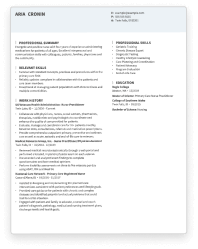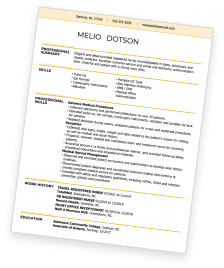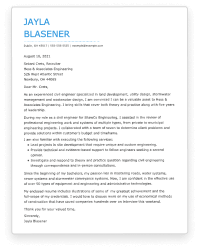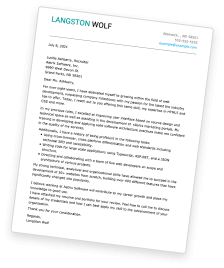Software Engineer Resumes: Overview
As a software engineer, you are the architect behind cutting-edge technology solutions.
Your responsibilities may vary depending on the industry but may include developing and implementing software applications, collaborating with cross-functional teams, or troubleshooting and debugging software issues.
Software engineers are in high demand in many work environments, including:
- Tech startups
- Fortune 500 companies
- Government agencies
- Consulting firms
- Research institutions
To succeed in software engineering, you need expertise in programming languages like Java, Python, or C++, strong problem-solving abilities, and excellent communication skills.
Ready to build a standout resume that highlights your software engineering skills and experiences?
Explore our impressive resume examples for inspiration and try out one of our downloadable templates below!
Software Engineer Resume: Choose a Format
The first step in creating a winning resume for a software engineer is to choose a format. The right resume format is crucial for effectively showcasing your skills and experiences.
Let’s delve into the three main formats for a software engineer’s resume:
Chronological Resumes for Software Engineers
Chronological resumes provide a detailed look at your work history by listing your previous jobs in reverse order, providing a clear timeline of your professional journey.
Then, beneath each job listed, you describe your responsibilities and accomplishments in each role in bulleted sentences.
Pro Tip: A chronological format is the most traditional choice for a resume, meaning it will be familiar to potential employers and highly compatible with applicant tracking systems (ATS).
Chronological resumes are an excellent choice for those with a solid employment background in software engineering because they allow you to highlight your career progression and achievements over time, providing a clear timeline of your professional journey.
Functional Resumes for Software Engineers
Functional resumes take a different approach. Choose a functional format to emphasize your skills and qualifications rather than your work history.
This format can work well for recent graduates, candidates who need more relevant work experience, or someone with a significant gap in employment.
Pro Tip: Some recruiters may prefer a more traditional chronological format, so always consider the preferences of your target audience.
By highlighting your relevant skills upfront, you can grab the recruiter’s attention and demonstrate your suitability for the role.
Combination Resumes for Software Engineers
Combination resumes offer the best of both worlds by combining elements of chronological and functional formats. This format allows you to showcase your work history and skills equally.
Pro Tip: The combination format is particularly suitable for software engineers with limited professional experience or unique skill sets.
A combination format places your skills and qualifications above a detailed work history to present a holistic picture of your abilities.
However, a combination format can increase the length of your resume, which could be a potential drawback. Busy recruiters prefer a concise resume that is at most 1 – 2 pages long.
Choosing a Format
When choosing a resume format, consider your unique experiences and the specific requirements of the job you’re applying for.
While chronological resumes are ideal for showcasing steady software engineering career progression, functional resumes highlight skills, and combination resumes offer flexibility and versatility, allowing you to tailor your resume to suit your needs and preferences.
Pro Tip: When in doubt, career experts recommend a chronological resume. Even if you lack relevant experience, you can tailor your resume content to showcase your most relevant skills.
For example, you can create an additional section highlighting relevant coursework or projects that prepared you for your role as a software engineer, which employers will value because this experience demonstrates your qualifications.
Ultimately, the key is to select a software engineer resume template and format that best showcases your qualifications and maximizes your chances of success in landing your dream job.
How to Write a Software Engineer Resume
Once you choose a template and a resume format, you are ready to craft the best software engineer resume that grabs the attention of hiring managers!
Like how most resumes are outlined, your software engineer resume will include five key sections:
- Contact Information
- Summary or Objective
- Work History
- Skills
- Education
In addition, you may include other sections, such as certifications or awards, as long as they highlight your relevant qualifications.
By following this how-to resume writing guide and tailoring each section to highlight your unique strengths and experiences, you’ll be well on your way to crafting a standout software engineer resume that impresses recruiters and lands you interviews!
Contact Information
Start by placing your contact details at the top of your software engineer resume. Include your:
- Full Name
- City and State
- Professional Email Address
- Phone Number
- LinkedIn Profile (optional)
- Online Portfolio (optional)
Here’s an example of what the contact information section for a software engineer may look like:
Joanne Smith
Austin, TX
JoanneSmith@fake.email.com
555-555-5555
fake.linkedin.com/in/joannesmith
Always double-check your contact information to ensure it is accurate and up to date. After all, you don’t want to miss out on a great opportunity because of a typo!
Summary or Objective
Next, you will write either a summary or an objective statement to introduce your resume.
This brief, two to four-sentence introduction will serve as your elevator pitch, providing recruiters with a snapshot of your qualifications and career aspirations.
A resume summary is ideal for experienced software engineers who want to highlight their key accomplishments and skills. This overview of your qualifications should be tailored to the specific job you’re applying for and emphasize your most relevant achievements and expertise.
For example, a well-written summary for a software engineer resume may look like this:
“Dedicated software engineer with over 5 years of experience developing robust and scalable software solutions. Proficient in Java, Python, and JavaScript, with a proven track record of delivering high-quality code on time and within budget. Skilled in leading cross-functional teams and collaborating with stakeholders to drive project success.”
An objective statement, on the other hand, is more suitable for entry-level candidates or those seeking a career change. It should clearly state your career goals and aspirations and explain how your skills and experiences align with the job you’re applying for.
Here’s an example of a well-written objective statement for a software engineer resume:
“Results-driven software engineer seeking to leverage my technical skills and passion for innovation in a dynamic software development environment. Eager to contribute to a collaborative team and tackle complex challenges to drive business growth and success.”
When deciding between a summary and an objective, consider your experience level and career goals.
The template of your software engineer resume should, in one way or another, have a section at the beginning that allows you to quickly pitch your qualifications and interest in the position you are applying to.
Pro Tip: Whichever one you choose, this section is an opportunity to use industry terms and keywords from the job posting to help your resume stand out to the ATS and potential employers.
A good rule of thumb to follow is if you have significant experience in software engineering, a summary is recommended because it helps further showcase your proven abilities.
However, if you’re just starting out or transitioning into a new role, an objective statement can help clarify your intentions and demonstrate your enthusiasm for the position while also highlighting technical or transferable skills.
Work History
Next, you will provide a detailed work history on your software engineer resume to showcase your experience and qualifications. Start by listing your previous jobs chronologically, starting with your most recent role and working backward.
Each job entry should include the following information:
- Job Title
- Employer’s Name
- Employers City and State
- Dates of Employment.
Then, under each job entry, write at least three bulleted sentences to describe your key responsibilities and accomplishments.
Pro Tip: To engage the reader and make a strong impression, use action verbs like “developed,” “implemented,” and “collaborated” to demonstrate your contributions effectively.
Additionally, quantify your achievements whenever possible by including numbers, percentages, or other metrics to showcase your specific impact in each role.
For example, an entry in the work history section of a software engineer’s resume may look something like this:
Software Engineer
XYZ Tech Company, San Francisco, CA May 2018 – Present
- Developed and implemented over 100 scalable backend solutions for a high-traffic e-commerce platform, resulting in a 30% increase in website performance.
- Collaborated with 4 cross-functional teams to design and launch 11 new features, reducing customer support tickets by 20%.
- Conducted code reviews and mentored 12 junior developers, improving team productivity and code quality by 35%.
Remember to focus on information demonstrating your fit for the role you are applying for. Read the job description carefully and include details that relate directly to the requirements listed in the job posting.
Skills
Next, you will create a dedicated skills section on your resume to showcase your technical prowess and proficiency in programming languages, tools, and technologies relevant to software engineering.
Include both technical skills, such as coding languages, and soft skills, like problem-solving, communication, and teamwork.
Pro Tip: Remember to tailor your skills section to align with the job requirements you’re applying for.
To help you get started, we have compiled a list of the top hard skills and soft skills for a software engineer resume:
Top 5 Hard Skills for a Software Engineer Resume
- Programming Languages: Proficiency in languages such as Java, Python, or C++ is essential for software engineers. These skills enable you to develop robust and efficient software solutions, troubleshoot issues, and optimize performance.
- Software Development: Experience in software development methodologies like Agile or Scrum, along with knowledge of version control systems like Git, demonstrates your ability to collaborate effectively in a team environment and deliver high-quality code.
- Database Management: Understanding database systems such as SQL or NoSQL is crucial for managing and manipulating data in software applications. Proficiency in database design, optimization, and maintenance enhances your ability to create scalable and efficient solutions.
- Web Development: Knowledge of front-end technologies like HTML, CSS, and JavaScript, combined with expertise in frameworks such as React or Angular, enables you to create dynamic and responsive web applications that meet user needs and business requirements.
- Software Testing and Debugging: Skills in testing frameworks like JUnit or Selenium, along with proficiency in debugging tools and techniques, ensure the reliability and functionality of software applications by identifying and resolving errors and issues.
Top 5 Soft Skills for a Software Engineer Resume
- Problem-Solving: As a software engineer, you’ll encounter complex technical challenges regularly. Strong problem-solving skills allow you to analyze issues, identify solutions, and implement effective strategies to overcome obstacles and deliver successful outcomes.
- Communication: Effective communication skills, both verbal and written, are essential for collaborating with team members, presenting ideas, and documenting technical processes. Clear and concise communication ensures that project requirements are understood and executed correctly.
- Creativity: Software engineering often requires innovative thinking to develop novel solutions to technical problems. Creativity allows you to approach challenges from different perspectives, experiment with new ideas, and drive innovation in software development.
- Time Management: Managing your time effectively and prioritizing tasks is crucial in a fast-paced software development environment. Strong time management skills enable you to meet deadlines, allocate resources efficiently, and maintain productivity.
- Adaptability: In the ever-evolving field of technology, adaptability is vital to staying relevant and competitive. Being open to learning new technologies, methodologies, and tools allows you to adapt to changing requirements and embrace opportunities for growth and development.
By highlighting both your hard and soft skills, you demonstrate to employers that you possess the computer skills and personal qualities necessary to excel as a software engineer.
Here’s an example of what an effective skills section for a software engineer resume might look like:
SKILLS
- Programming Languages: Java, Python, C++
- Software Development: Agile, Scrum, Git
- Database Management: SQL, NoSQL
- Web Development: HTML, CSS, JavaScript, React, Angular
- Software Testing and Debugging: JUnit, Selenium
- Problem-Solving and Creativity
- Team Communication
- Meticulous Attention to Detail
Education
Next, on your software engineer resume, you will provide details of your educational background, including the degree earned, institution name, graduation date, and any relevant coursework or academic achievements.
While your education is important, it typically takes a back seat to your work experience and skills in a software engineer resume.
For an experienced software engineer, this section will simply demonstrate that you meet the job’s minimum requirements.
However, if you’re a recent graduate or have limited work experience, your education section can help showcase your qualifications.
Pro Tip: You can include relevant coursework, showcase special projects, or include impressive academic achievements to make up for a lack of work experience.
A typical education section for a software engineer resume might look like this:
EDUCATION
Bachelor of Science in Computer Science
XYZ University, Houston, TX
Additional Sections
Once you have carefully crafted the five most essential sections of your software engineer resume, consider including optional sections to further enhance it. Additional sections can showcase your expertise and unique qualifications if you have the page space.
Some additional sections to consider include:
- Certifications
- Professional Associations
- Awards and Honors
- Projects or Publications
- Relevant Hobbies
These additional sections provide recruiters with a more comprehensive understanding of your background and demonstrate your passion for software engineering beyond your day-to-day work responsibilities.
Pro Tip: Make sure to add additional sections only if they enhance your resume. Irrelevant information will take up space that can be put to better use!
Here are some examples of how you might provide additional sections to your software engineer resume:
Certifications
- AWS Certified Solutions Architect – Associate: Proficiency in designing distributed applications and systems on the AWS platform.
- Certified ScrumMaster (CSM): Expertise in Scrum methodologies and ability to lead Agile projects.
- Oracle Certified Professional, Java SE 8 Programmer: Expertise in Java programming and software development.
Professional Associations
- Association for Computing Machinery (ACM): Active member since 2020, participating in webinars and local meetups, contributing to discussions on software development trends and best practices.
- IEEE Computer Society: Engaged in technical committees and contributed articles to society publications on topics related to machine learning and artificial intelligence.
Awards and Honors
- Best Mobile App Developer: Awarded at the 2023 National Software Innovation Conference for developing a health and fitness app that gained widespread recognition.
- Dean’s List: Recognized for academic excellence in the Bachelor of Science in Computer Science program at XYZ University, 2019-2021.
Top Certifications For Software Engineers
For most software engineers writing a resume, creating a separate section for your certifications can make your qualifications stand out.
Here are some of the top certifications for a software engineer’s resume to consider:
- AWS Certified Solutions Architect: Showcase your knowledge and skills in AWS technology by including this certification on your resume. The focus of this certification is on the design of cost- and performance-optimized solutions, demonstrating a strong understanding of the AWS Well-Architected Framework.
- Certified Secure Software Lifecycle Professional: This cybersecurity certification validates your skills in software development safety and security practices.
- Professional Software Developer Certification: This designation by the IEEE Computer Society is an advanced certification that requires at least two years of professional experience and previous certifications.
- C++ Institute Certifications: C is one of the most integral programming languages for a software engineer. Earning certifications in programming languages will demonstrate your competence in software development.
- ScrumAlliance Agile Certifications: Earning a certification in agile project management will demonstrate your ability to manage large projects and work in cross-functional teams to solve problems.
8 Tips For Writing A Software Engineer Resume
Tailor your resume to each job application: Review the software engineer job description carefully and customize your resume to highlight the skills and experiences most relevant to the position. Showcase your expertise in specific programming languages, tools, and technologies mentioned in the job posting.
Use keywords from the job description: Incorporate industry-specific keywords and phrases from the job description to optimize your resume for applicant tracking systems (ATS). These systems scan resumes for relevant keywords, so including them increases your chances of getting noticed by recruiters.
Quantify your achievements with numbers and metrics: When describing your work experience, quantify your accomplishments whenever possible. For example, mention how you improved software performance by a certain percentage, reduced project completion time, or increased user engagement metrics.
Highlight your problem-solving abilities: Software engineering is all about solving complex problems. Use your resume to showcase your problem-solving skills by describing how you tackled challenges, resolved technical issues, and implemented innovative solutions in your previous roles.
Showcase your proficiency in programming languages and technologies: Clearly list the programming languages, tools, and technologies you’re proficient in, prioritizing those most relevant to the job you’re applying for. Provide specific examples of projects or achievements demonstrating your expertise in each area.
Proofread your resume carefully: Mistakes or typos can undermine your professionalism and attention to detail. Take the time to review your resume multiple times, checking for spelling and grammar errors, formatting inconsistencies, and clarity of content. Consider asking a friend or colleague to review it as well for fresh eyes.
Include a portfolio or link to relevant projects: If you have a portfolio of work or relevant projects, include a link to it in your resume. This allows recruiters to see your technical skills in action and provides additional context for your experience. Make sure your portfolio is well-organized and showcases your best work.
Stay updated on industry trends and technologies: The field of software engineering is constantly evolving, so it’s essential to stay current with the latest trends, tools, and technologies. Follow industry blogs, attend conferences or webinars, and participate in online communities to keep your skills sharp and remain competitive in the job market.
More Software Engineer Resume Examples
If you still are looking for a software engineer resume template that fits your preferences, consider some of the samples below for more options.
Use these templates in combination with our resume builder to quickly customize your resume in minutes, and get applying to jobs faster than ever!
Helping Job Seekers Like You


Use Hloom's Resume Builder
Key Takeaways
- Choose the right resume format to showcase your software engineering skills and experiences effectively.
- Highlight your technical skills, programming languages, and relevant certifications to demonstrate your qualifications as a software engineer.
- Tailor your software engineer resume to each job application to make your resume TS-friendly and increase your chances of success.
- Quantify your achievements with numbers and metrics on your resume to demonstrate your impact as a software engineer.
- Stay updated on industry trends and technologies to remain competitive in the software engineering job market.
Use Hloom's Cover Letter Builder


FAQ
Next, make sure to outline your resume with the five key sections: contact information, a summary or objective, work history, skills, and education. Consider additional sections, such as awards or certifications, if they are relevant and expand your qualifications.
Your resume should demonstrate your knowledge and expertise in software engineering. This is especially true in your work history section, which should contain qualifiable examples of responsibilities and achievements, that employers can use to gauge your unique impact.
Your resume should be easy to read by applicant tracking systems (ATS) and employers, without sacrificing your qualifications. To ensure this, consider using an expertly created software engineer resume template from this page.
Sources
- Bureau of Labor Statistics. Occupational Outlook Handbook. Software Developers, Quality Assurance Analysts, and Testers. U.S. Department of Labor. September 2023.
- Lian, T., & Zuke, J. 18 résumé writing tips to help you stand out. The Wall Street Journal. May 2021.
- University of Michigan, "Resume Resources," November 2023.



















